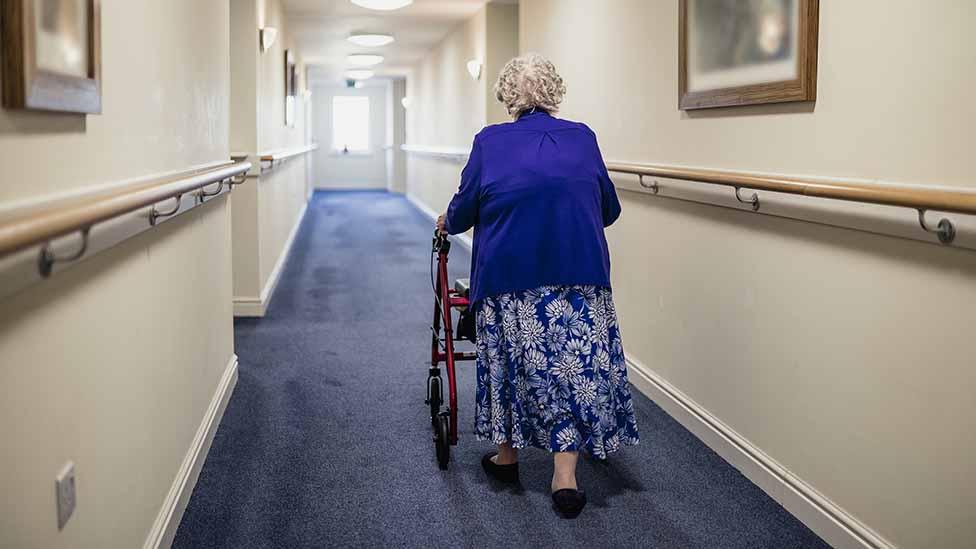Coronavirus: NI care homes 'felt forgotten about' as virus hit
- Published
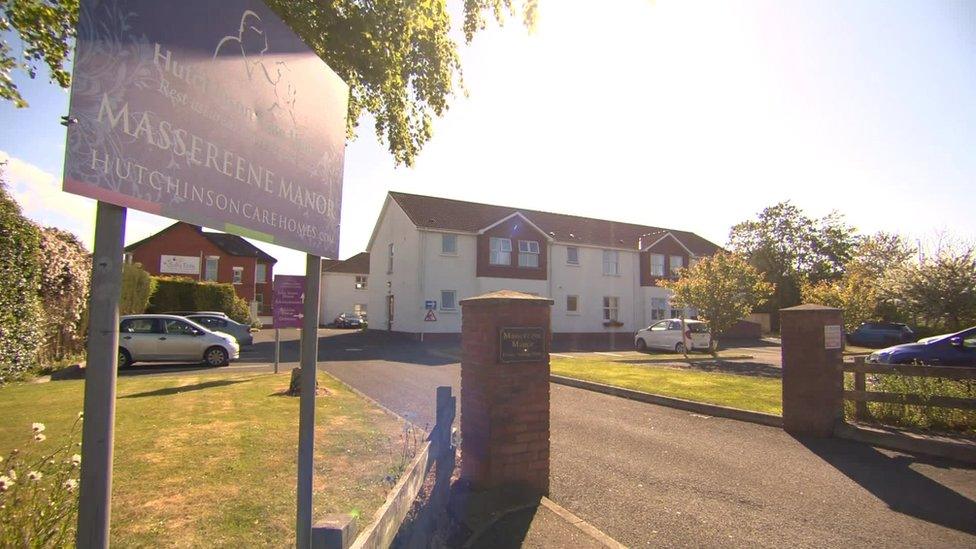
Care home residents and staff felt "forgotten about" at the start of the coronavirus pandemic, a manager has said.
Eddy Kerr of the Hutchinson Care Homes group said they struggled to source personal protection equipment (PPE) and maintain safe staffing levels.
People were listening but not responding, he said.
The Department of Health rejected the claims, saying support to fight outbreaks had always been available.
A spokesperson added that representatives of the care home sector had been involved in departmental planning from an early stage.
Mr Kerr was speaking as BBC News NI was given exclusive access inside Massereene Manor nursing home in Antrim.
Cameraman John Morrissey filmed for BBC News NI in the 74-bed facility, which specialises in caring for elderly patients with dementia and went into lockdown on 23 March.
Mr Kerr, operations manager for seven facilities in all, told BBC News NI that he felt no-one in authority was responding to their pleas for help at the start of the pandemic.
He asked: "Is it possible that everyone was so tied up in other parts of the sector, with what they were used to dealing with on a day-to-day basis, that we did get forgotten?"
"That sounds a little bit emotive saying we were forgotten, but that's how it felt like in those early days."
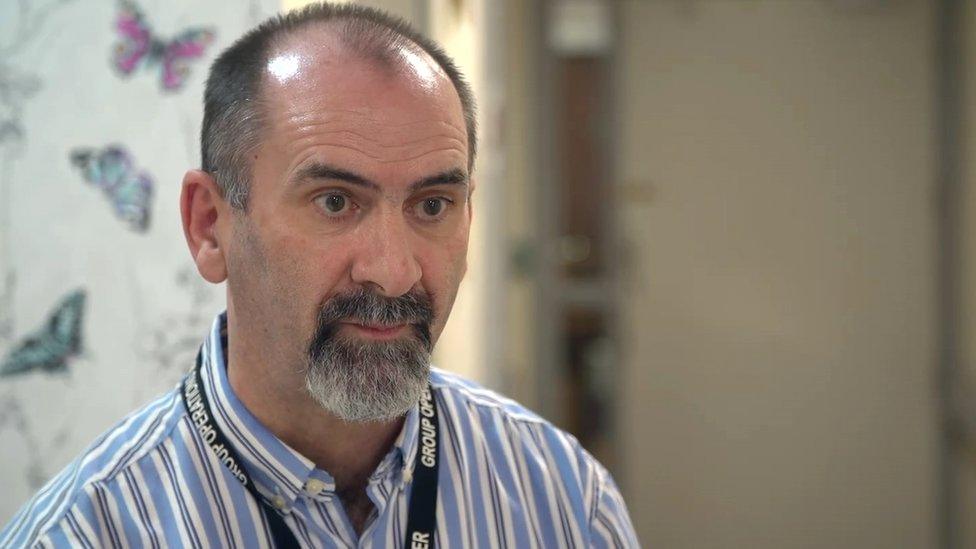
Eddy Kerr has 32 years experience in the sector
So far, there have been six confirmed Covid-19 related deaths, but the home believes more deaths have yet to be attributed to the disease.
A further 19 residents have tested positive for coronavirus.
According to the latest figures from the Northern Ireland Statistics and Research Agency (Nisra) there have been 232 confirmed Covid-19 deaths in care homes across Northern Ireland - which accounts for 45% of all coronavirus-linked deaths.
'Frustrating'
Although he has acknowledged an improvement in support from officials in recent weeks, Mr Kerr, who has 32 years' experience, described the beginning of the pandemic as "frustrating and a struggle".
The home care sector was effectively "left to their own devices" and had to make do, relying on the generosity of others including staff for essentials such as face masks and PPE, he said.
He added: "I think people were listening but I don't think people were responding initially.
"It was a very slow response and in some ways it still is a slow response but we are getting there."
The home has also raised the issue of universal testing and how it would have benefited from all residents and staff being tested from early on in the pandemic.
Mr Kerr said: "Support has been there at different times and is getting better."
'Drop in the ocean'
The Department of Health has previously pledged £6.5 million of funding to assist the care home sector.
Mr Kerr said his company had not received any funds yet and warned it was a "drop in the ocean" in terms of what was needed in the sector.

LOCKDOWN UPDATE: What's changing, where?
SCHOOLS: When will children be returning?
EXERCISE: What are the guidelines on getting out?
THE R NUMBER: What it means and why it matters
AIR TRAVELLERS: The new quarantine rules
LOOK-UP TOOL: How many cases in your area?
GLOBAL SPREAD: Tracking the pandemic
RECOVERY: How long does it take to get better?
A SIMPLE GUIDE: What are the symptoms?

Meanwhile, a nursing manager, Anne McCracken, was critical of the lack of information being passed on to care homes and was only able to prepare properly by watching what happened elsewhere in places such as Italy and Spain.
She told BBC News NI: "I was playing catch up."
Responding to the claims, the Department of Health said in a statement that representatives of the care home sector had been involved in departmental planning from an early stage.
A spokesperson said: "Support from the Public Health Agency has always been available where homes face an infectious disease outbreak.
"In addition, we have bolstered that support through the RQIA's service support team, moved early to guarantee income for care homes, and quickly directed trusts to support homes with both PPE and staffing issues.
"Millions of pieces of PPE and thousands of staff hours have been provided without charge to care homes.
"We expect the payments from the £6.5m additional assistance to be paid to care homes this Friday."
The spokesperson added: "Covid-19 has sadly proved devastating for many care home residents across these islands and in mainland Europe.
"There will undoubtedly be many lessons to learn from this pandemic - including the pressing need for major reform of social care."
The Department of Health told BBC News NI that the Northern Trust had provided a wide range of support for Massereene Manor, including PPE, staff cover for 30 shifts, support for end-of-life care including training for staff, as well as information and support packs on bereavement and grief.
It also provided support from a senior staff member on infection control.
What is the situation in care homes in Northern Ireland?
Official statistics released last Friday showed that for a second week, there have been more deaths in care homes (71) than hospitals (39).
Overall, there have been 232 care home deaths related to coronavirus.
Deputy First Minister Michelle O'Neill said universal testing for Covid-19 should take place across all of NI's care homes immediately
Why do care homes have such high mortality figures from Covid-19?
Northern Ireland's Chief Medical Officer Dr Michael McBride said there was a degree of inevitability about the prevalence of the virus in care homes.
"It could be anticipated that those older people in our society, those with underlying health conditions would pay a higher price," Dr McBride told BBC Radio 4's Any Questions? programme.
He said as community transmission has decreased across the UK, transmission in care setting, including hospitals and care homes, has "sadly and tragically" increased.
"There was an inevitability to that," he said.
The BBC supplied its own PPE during filming.
- Published8 May 2020
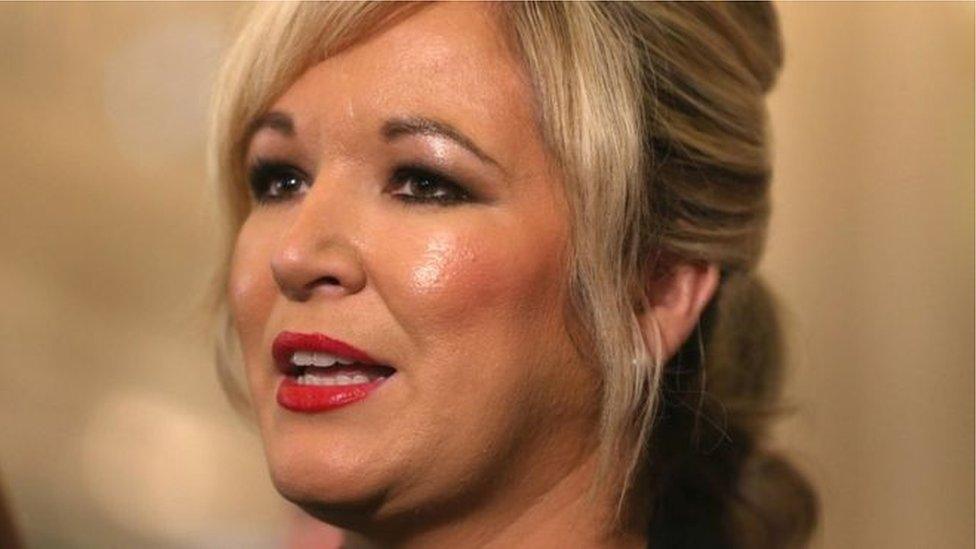
- Published1 May 2020
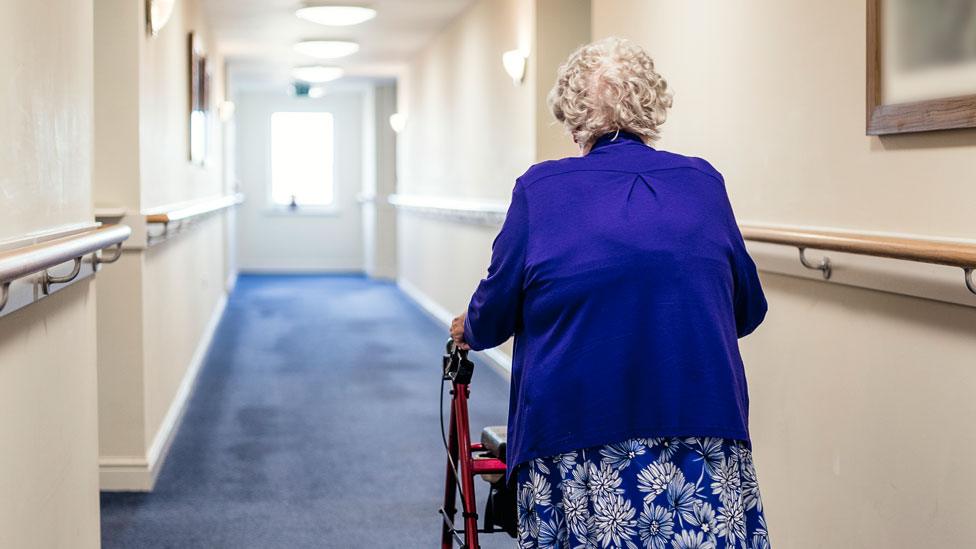
- Published6 May 2020
